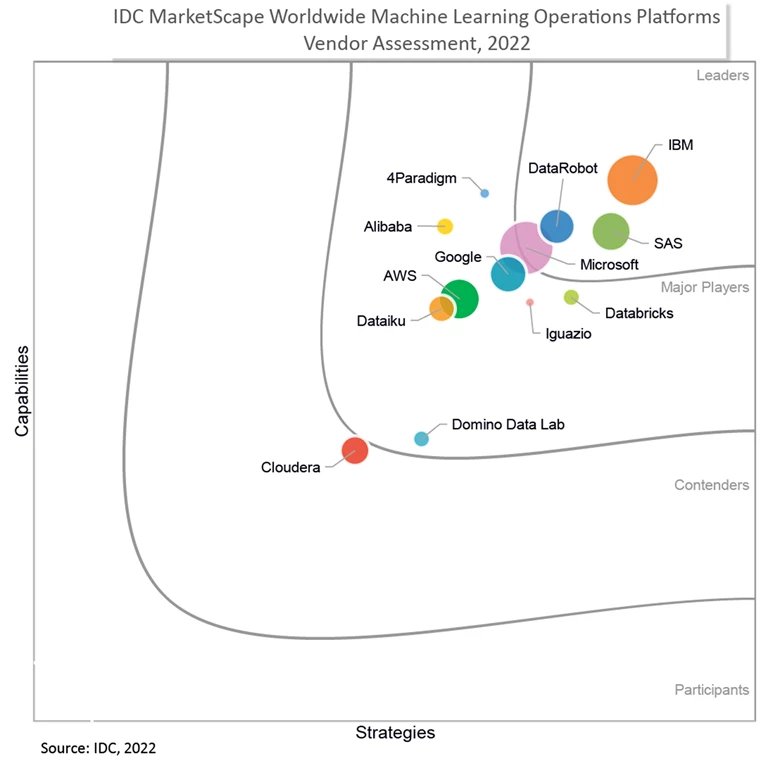We’re excited to share that Microsoft has been recognized as a Leader in the IDC MarketScape Worldwide Machine Learning Operations (MLOps) Platforms 2022 Vendor Assessment. Microsoft holds a deep understanding of MLOps market trends, strong customer adoption, broad partner ecosystem, and continued product investments in building a differentiated MLOps platform.

The report cited several key strengths including product and business capabilities across the entire machine learning (ML) lifecycle as well as an expansive customer footprint and partner network.
“Microsoft provides a wide array of enterprise-grade MLOps tools for quality and compliance that can augment any ML development environment on-premises, across clouds, or in a hybrid cloud environment.” -IDC MarketScape: Worldwide Machine Learning Operations Platforms 2022 Vendor Assessment
Source: “IDC MarketScape: Worldwide Machine Learning Operations Platforms 2022 Vendor Assessment”, By: Kathy Lange, Raghunandhan Kuppuswamy, and David Schubmehl, December 2022, IDC #US48325822.
Do more with less with MLOps on Azure
While machine learning becomes more mainstream across industries, there are many challenges like data governance, security, data compliance, and auditability that companies need to consider when productionizing machine learning models. These organizations look to a unified machine learning platform to manage the entire ML lifecycle to bring models to production faster and at scale, improving operational efficiencies of data science teams with MLOps. At Microsoft, we consider MLOps as a philosophy rather than a product and, as such, our approach incorporates people, processes, and platform to deliver continuous value with fewer resources for machine learning. MLOps bring benefits to organizations by automating repeatable actions, facilitating collaboration across teams, and ensuring full visibility and reproducibility into the end-to-end ML lifecycle.
Azure Machine Learning helps data scientists and ML engineers streamline training, deployment, and management of thousands of models across on-premises, multicloud, and even at the edge using native MLOps capabilities such as model registry, CI/CD pipelines with deep integration with Azure DevOps and GitHub, managed online endpoints for real-time inference, and experiment tracking and lineage with MLflow. PepsiCo has been using MLOps capabilities in Azure Machine Learning to automate model creation and deployment and analyze store customer data to respond to customer demand more efficiently. In fact, they have succeeded in eliminating 4,300 days of manual work a year.
Enhance collaboration across the organization
We believe machine learning is a team sport that requires collaboration across people with a different range of skill sets, such as data scientists, machine learning engineers, and IT admins. One of the key features mentioned in the report is that Azure Machine Learning enables greater collaboration across multiple data science teams through registries. Registries in Azure Machine Learning are organization-wide repositories of machine learning assets: models, environments, and components. Registries make multi-environment MLOps easier by helping teams share and reuse models developed in a different workspace, by a different team without manually copying them over.
Another feature that fosters collaboration between data scientists and business professionals is the Responsible AI dashboard and scorecard, a single interface to help organizations implement Responsible AI in practice effectively and efficiently. The Responsible AI scorecard helps contextualize the model and data health insights with both technical and non-technical audiences, bringing stakeholders along as well as assisting in compliance reviews. Microsoft is committed to accelerating our innovations in Responsible AI.
Microsoft is proud to be recognized as a Leader in the IDC MarketScape Worldwide MLOps Platforms 2022 Vendor Assessment, and we are excited by innovations happening at Microsoft and across the industry that empower data scientists and machine learning engineers to fully operationalize the ML lifecycle.
Learn more
- Explore other analyst reports for Azure AI.
- Read the latest feature announcements from Azure Machine Learning on the Tech Community blog.
About the graphic:
IDC MarketScape vendor analysis model is designed to provide an overview of the competitive fitness of ICT suppliers in a given market. The research methodology utilizes a rigorous scoring methodology based on both qualitative and quantitative criteria that results in a single graphical illustration of each vendor’s position within a given market. The Capabilities score measures vendor product, go-to-market, and business execution in the short term. The Strategy score measures alignment of vendor strategies with customer requirements in a 3-5-year timeframe. Vendor market share is represented by the size of the circles. Vendor year-over-year growth rate relative to the given market is indicated by a plus, neutral, or minus next to the vendor name.
